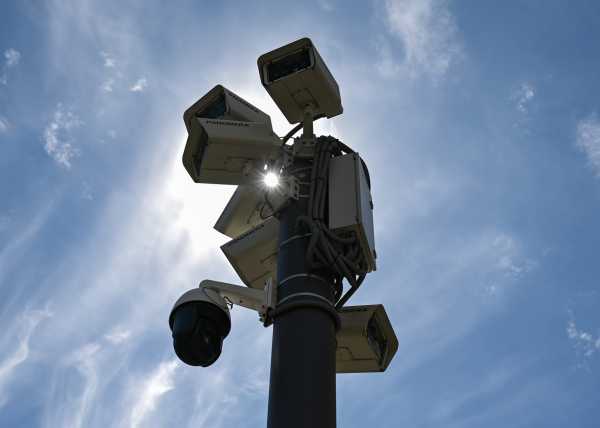
Hendrith Vanlon Smith, Jr. said, “Good cities implement good systems design – systems that cultivate life, systems that utilize waste, systems that promote wellbeing among its residents.” Bad cities, by contrast, instill fear and paranoia among their residents.
That paranoia leads to surveillance. And while American citizens are already heavily surveilled, things are about to get much worse. Over the next two decades, cities across United States are set to spend tens of trillions of dollars on additional cameras and sensors, collecting even more data on the American people. U.S. cities are slowly evolving into “smart cities,” and “smart” in this sense is a synonym for surveillance. Big Brother, in other words, is about to get a whole lot bigger.
Advertisement
A smart city is defined by its methods of data collection: facial-recognition software, CCTV cameras, traffic cameras, road sensors, and more. Don’t we already have this technology? Yes, we do, but in smart cities, these devices will work together and feed data to a large common network. In the not-too-distant future, if you happen to live in one of these cities, you will be monitored 24 hours a day, 365 days a year. And where there’s data, there’s a Big Tech company. And Big Tech behemoths desperately want to build these data-grabbing cities.
While it’s a cliche to bring up Orwell, any discussion of smart cities immediately calls to mind 1984. Orwell used the term “Big Brother” to describe overly controlling authority figures, people only too eager to surveil the masses. Of course, Orwell wasn’t discussing the World Economic Forum, but, if you were to read 1984 today, you would be forgiven for thinking otherwise.
This brings us onto the G20 Global Smart Cities Alliance on Technology Governance, led by the good people in Davos. As the WEF proudly tells us, this alliance is the largest initiative in the world dedicated to the “ethical use of smart city technologies.” When the WEF, the international organization behind the Great Reset, uses the word “ethical,” skepticism is warranted. The WEF has partnered with more than “200,000 cities and local governments, companies, start-ups, research institutions and non-profit organizations” to push smart-city technology. Considering there are only 10,000 cities in the world, it’s safe to assume that the effects of the alliance will touch every part of the world, including the U.S.
If you’re wondering what a smart city looks like, let me point you to China, a country that’s synonymous with “surveillance.” As the academic Fan Yang noted a few years ago, the Chinese Communist Party (CCP) uses smart technology to tackle absolutely everything, “from resource management, environmental issues and traffic congestion, to welfare systems and the lack of social trust.” How does the CCP do this? Through highly connected smart buildings (think of an apartment complex crossed with a GPS tracker), omnipresent surveillance systems, Wi-Fi tracking devices, Q.R. codes, and, of course, a brutal social-credit system.
With a little help from the U.S., the CCP has weaponized surveillance systems. Fears of state surveillance, wrote Fang, were amplified when Apple handed over “management of the Chinese portion of its cloud computing services to companies run by the state.”
Advertisement
Speaking of Apple, back home, the Big Apple is fast becoming the United States’s first major smart city. According to a report published by Hellmann Electric, a world leader in the electrical construction industry, cities like NYC will soon use real-time data, as well as “log files, networks, web, transactional applications and social media,” and turn this “continuous flow of data into actionable information.” To do this, however, city governments must be prepared to integrate “many existing and next-generation technologies throughout a layered ecosystem and across multiple domains.”
Subscribe Today Get weekly emails in your inbox Email Address:
In the U.S., some smart cities are being built from scratch, with the billionaire Bill Gates, a friend of the WEF, eager to build his own highly surveilled utopia.
A smart city is a surveillance city. Sure, more sensors and more cameras could help curb crime. But we must ask ourselves: what sort of problems will these sensors and cameras create? As we have seen in the past with Facebook, Google, and the aforementioned Apple, government regulations simply can’t keep up with new technology. Privacy abuses are already a serious issue. They have been since the turn of the century. In 2020, the global smart cities market was worth a paltry $648 million; by 2030, it will be worth $6 billion. The largest market for smart cities? North America. Orwell’s Big Brother was fiction; the Davos-inspired Big Brother is reality.
This New Urbanism series is supported by the Richard H. Driehaus Foundation. Follow New Urbs on Twitter for a feed dedicated to TAC’s coverage of cities, urbanism, and place.
Advertisement
Sourse: theamericanconservative.com